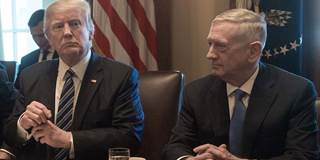The US Department of Defense’s decision to drop an 11-ton "super bomb" over a geographically isolated Islamic State redoubt in Afghanistan does not reflect a coherent counterterrorism policy. In fact, it was an example of political leaders allowing military means to determine foreign-policy ends.
NEW YORK – The US Department of Defense’s decision to drop an 11-ton Massive Ordnance Air Blast (MOAB) bomb over a remote Islamic State (ISIS) redoubt in Afghanistan does not reflect a coherent counterterrorism policy. As many commentators have pointed out, it was yet another case of tactics swallowing strategy – a mode of policymaking that was auditioned a week earlier in Syria and that could lead to catastrophe if tried on, say, the Korean Peninsula.
More specifically, the Afghan attack was an example of letting military means determine policy ends. Rather than identifying an urgent national-security threat and weighing the options for countering it, US military commanders seem to have perused America’s unused arsenal, happened upon the MOAB, and sought a place where its power could be put on display.
Naturally, they had to find a relatively civilian-free target, but not necessarily one posing a serious national-security threat, or serving as an important stronghold of the Afghan insurgency. The all-purpose rationale for dropping a MOAB in the Afghan mountains was that, after eight years of Barack Obama’s alleged weakness, using America’s largest nonnuclear bomb would “restore deterrence.” Never mind that a global, decentralized network of extremists will hardly be deterred by high-intensity detonations over remote badlands.

NEW YORK – The US Department of Defense’s decision to drop an 11-ton Massive Ordnance Air Blast (MOAB) bomb over a remote Islamic State (ISIS) redoubt in Afghanistan does not reflect a coherent counterterrorism policy. As many commentators have pointed out, it was yet another case of tactics swallowing strategy – a mode of policymaking that was auditioned a week earlier in Syria and that could lead to catastrophe if tried on, say, the Korean Peninsula.
More specifically, the Afghan attack was an example of letting military means determine policy ends. Rather than identifying an urgent national-security threat and weighing the options for countering it, US military commanders seem to have perused America’s unused arsenal, happened upon the MOAB, and sought a place where its power could be put on display.
Naturally, they had to find a relatively civilian-free target, but not necessarily one posing a serious national-security threat, or serving as an important stronghold of the Afghan insurgency. The all-purpose rationale for dropping a MOAB in the Afghan mountains was that, after eight years of Barack Obama’s alleged weakness, using America’s largest nonnuclear bomb would “restore deterrence.” Never mind that a global, decentralized network of extremists will hardly be deterred by high-intensity detonations over remote badlands.